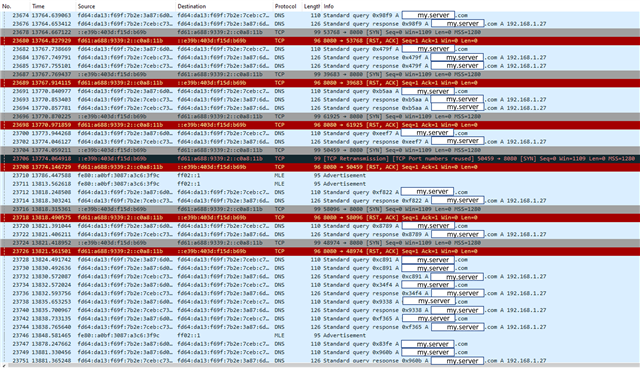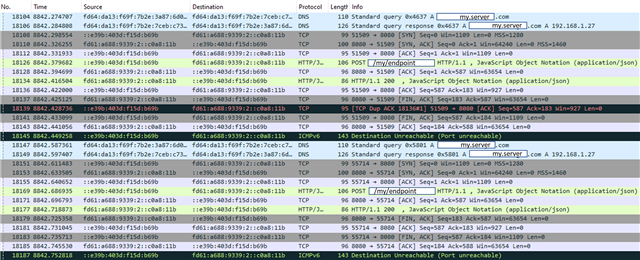I am doing HTTP POST's and GET's from my nRF52840-based device to a Java Spring Boot HTTP server running on a laptop via TCP. The device is communicating with a border router via OpenThread. The border router and my laptop are both on my local WAN (laptop's IP is 192.168.1.27). When the device boots up and the server is running, I can do POST's and GET's without issue. When I turn off the server to test the device's reconnection logic, I see the SYN message from the device trying to establish a connection with the server. The connect() function subsequently returns (-1). If I bring the server back up while the device is still making these SYN attempts, the connection is re-established and everything resumes properly.
However, if I do not bring up the server after some time (usually a few minutes), the device stops sending SYN messages and only does DNS lookups of the server hostname. The connect() function still returns error (-1) but no longer actually tries to establish a connection. If I bring the server back up, the device never re-establishes connection with the server due to the lack of SYN messages.
What is going on with the device's TCP connection that causes it to stop SYN reconnection attempts?
OpenThread Wireshark traces:


Relevant Code:
#define HTTP_POST_MESSAGE_FORMAT \
"POST /%s HTTP/1.1\r\n" \
"Host: %s\r\n" \
"Connection: close\r\n" \
"Accept: application/json\r\n" \
"Content-Type: application/json\r\n" \
"Content-Length: %d\r\n" \
"\r\n" \
"%s"
static void otHTTPDNScallback(otError aError, const otDnsAddressResponse *aResponse, void *aContext)
{
otError oterr = OT_ERROR_NONE;
char tmpbuf[50];
uint16_t i=0;
if (aError==OT_ERROR_NONE)
{
while (oterr!=OT_ERROR_NOT_FOUND && i<40) //set an i-limit to avoid enless loop
{
oterr = otDnsAddressResponseGetAddress(aResponse, i, aContext, NULL);
if (oterr==OT_ERROR_NONE)
{
otIp6AddressToString(aContext, tmpbuf, sizeof(tmpbuf));
LOG_DBG("DNS returned IP addr #%d: %s",i,tmpbuf);
break; //use first found IP address
}
else
{
LOG_ERR("Error in otDnsAddressResponseGetAddress (err %d)", oterr);
}
i+=1;
}
}
else
{
LOG_ERR("Error in HTTP DNS lookup (err: %d)", aError);
}
k_sem_give(&getHTTPaddr_sem); //Need to hold main function until address is obtained in this
//callback. Return semaphore here so program can continue
}
char *HTTPPOST(char *ipv4host, char *path, uint8_t HTTP_API_TYPE, char *payload, uint16_t port_no)
{
int sock, err, msglen, recvlen;
char bufipv6[50];
char port_buf[7];
snprintf(port_buf, sizeof(port_buf),"%d",port_no);
memset(&response[0], 0, sizeof(response)); //Rezero response buffer
#if IS_ENABLED(CONFIG_OPENTHREAD_DNS_CLIENT)
otError oterr;
otIp6Address ot6addr;
LOG_DBG("otDnsClientResolveIp4Address server: %s",ipv4host);
if (otSrpClientIsRunning(openthread_get_default_instance()))
{
LOG_DBG("SRP client is running!");
}
else
{
LOG_WRN("SRP client is NOT running!");
}
oterr = otDnsClientResolveIp4Address(openthread_get_default_instance(), ipv4host,
otHTTPDNScallback, &ot6addr,
NULL);
k_sem_take(&getHTTPaddr_sem, K_SECONDS(5)); // Wait for DNS callback
//Convert openthread IPv6 address to string type
otIp6AddressToString(&ot6addr, bufipv6, sizeof(bufipv6));
LOG_DBG("IPv6 Address: %s", bufipv6);
static struct sockaddr brok;
struct sockaddr_in6 *brok6 = ((struct sockaddr_in6 *)&brok);
inet_pton(AF_INET6, bufipv6, &brok6->sin6_addr);
brok6->sin6_family = AF_INET6;
brok6->sin6_port = htons(port_no);
sock = socket(AF_INET6, SOCK_STREAM, IPPROTO_TCP);
if (sock<0) {
LOG_ERR("Error setting socket for HTTP POST, err %d. Returning NULL pointer.", sock);
(void)close(sock);
return NULL;
}
LOG_WRN("sock = %d\n", sock);
msglen = snprintf(msg,sizeof(msg), HTTP_POST_MESSAGE_FORMAT, path, ipv4host, strlen(payload), payload);
LOG_DBG("POST request:\n%s", msg);
err = connect(sock, &brok, sizeof(struct sockaddr_in6));
if (err<0) {
LOG_ERR("Failed to connect to host for HTTP POST, err %d. Returning NULL pointer.", err);
(void)close(sock);
return NULL;
}
err = send(sock, msg, msglen, 0);
if (err<0) {
LOG_ERR("Failed to send HTTP POST, err %d. Returning NULL pointer.", err);
(void)close(sock);
return NULL;
}
recvlen = recv(sock, response, sizeof(response) - 1, 0);
if (recvlen < 0) {
LOG_ERR("Error reading HTTP POSTT response, err %d. Returning NULL pointer.\n", err);
(void)close(sock);
return NULL;
}
LOG_WRN("HTTP response code: %d", ret_code);
LOG_DBG("recvlen = %d",recvlen);
LOG_DBG("HTTP POST Response:\n%s", response);
err = close(sock);
return (&response[0]);
}
Relevant configs:
CONFIG_ENABLE_THREAD_NETWORK=y CONFIG_OPENTHREAD_THREAD_VERSION_1_2=y CONFIG_OPENTHREAD_NORDIC_LIBRARY_MTD=y CONFIG_OPENTHREAD_FTD=n CONFIG_OPENTHREAD_MTD=y CONFIG_OPENTHREAD_MTD_SED=y CONFIG_SYSTEM_WORKQUEUE_STACK_SIZE=4096 CONFIG_OPENTHREAD_SHELL=n CONFIG_OT_CHANNEL=19 CONFIG_NET_IPV6=y CONFIG_NET_IPV4=n CONFIG_NET_CONFIG_SETTINGS=y CONFIG_NET_CONFIG_NEED_IPV4=n CONFIG_NET_CONFIG_NEED_IPV6=y # Configure dependencies CONFIG_IEEE802154_2015=y CONFIG_IEEE802154_NRF5_RX_STACK_SIZE=800 CONFIG_NRF_802154_ENCRYPTION=y CONFIG_IEEE802154_CSL_ENDPOINT=y CONFIG_NET_PKT_TXTIME=y CONFIG_NET_PKT_TIMESTAMP=y CONFIG_OPENTHREAD_MAC_SOFTWARE_TX_SECURITY_ENABLE=n CONFIG_IEEE802154_DRIVER_LOG_LEVEL_INF=y CONFIG_OPENTHREAD_DUA=y CONFIG_OPENTHREAD_MLR=y #CONFIG_OPENTHREAD_BACKBONE_ROUTER=y CONFIG_OPENTHREAD_LINK_METRICS_INITIATOR=y CONFIG_OPENTHREAD_LINK_METRICS_SUBJECT=y CONFIG_OPENTHREAD_CSL_RECEIVER=y # CSL configuration #CONFIG_OPENTHREAD_CSL_RECEIVE_TIME_AHEAD=3000 #CONFIG_OPENTHREAD_CSL_MIN_RECEIVE_ON=300 ##### OPENTHREAD ##### CONFIG_OPENTHREAD_THREAD_STACK_SIZE=7250 CONFIG_OPENTHREAD_DEBUG=y CONFIG_OPENTHREAD_L2_DEBUG=y CONFIG_OPENTHREAD_MANUAL_START=y CONFIG_OPENTHREAD_JOINER=y CONFIG_OPENTHREAD_JOINER_AUTOSTART=n CONFIG_OPENTHREAD_POLL_PERIOD=1000 # Generic networking options CONFIG_NETWORKING=y # Kernel options CONFIG_INIT_STACKS=y # Increase set for threads with meta-irq priority CONFIG_NUM_METAIRQ_PRIORITIES=1 # Logging CONFIG_NET_LOG=y #POWERSAVING CONFIG_NET_STATISTICS=y # Disable certain parts of Zephyr IPv6 stack CONFIG_NET_IPV6_NBR_CACHE=n CONFIG_NET_IPV6_MLD=n # Stack sizes configuration CONFIG_NET_TX_STACK_SIZE=1500 CONFIG_NET_RX_STACK_SIZE=1500 # Network buffers CONFIG_NET_PKT_RX_COUNT=8 CONFIG_NET_PKT_TX_COUNT=8 CONFIG_NET_BUF_RX_COUNT=26 CONFIG_NET_BUF_TX_COUNT=26 # L2 OpenThread enabling CONFIG_NET_L2_OPENTHREAD=y CONFIG_OPENTHREAD_L2_LOG_LEVEL_INF=y # Select OpenThread nRF Security backends CONFIG_OPENTHREAD_NRF_SECURITY_CHOICE=y # Enable ping sender support CONFIG_OPENTHREAD_PING_SENDER=y CONFIG_NET_MGMT_EVENT_INFO=y # Enable DNS-via-border-router's-upstream functionality CONFIG_OPENTHREAD_DNS_CLIENT=y CONFIG_OPENTHREAD_SRP_CLIENT=y CONFIG_OPENTHREAD_ECDSA=y # Network sockets CONFIG_NET_SOCKETS=y CONFIG_NET_SOCKETS_POSIX_NAMES=y CONFIG_NET_SOCKETS_POLL_MAX=4 # Enable TCP support CONFIG_NET_TCP=y # Required for SOCKET STREAM CONFIG_NET_UDP=y # Required for getting UTC time #CONFIG_NET_TCP_LOG_LEVEL_DBG=y CONFIG_OPENTHREAD_TCP_ENABLE=n #Socket settings CONFIG_POSIX_MAX_FDS=6 # IP address options CONFIG_NET_IF_UNICAST_IPV6_ADDR_COUNT=3 CONFIG_NET_IF_MCAST_IPV6_ADDR_COUNT=4 CONFIG_NET_MAX_CONTEXTS=8 # Download Client CONFIG_FOTA_DOWNLOAD=y CONFIG_DOWNLOAD_CLIENT=y CONFIG_DOWNLOAD_CLIENT_HTTP_FRAG_SIZE_4096=y CONFIG_DOWNLOAD_CLIENT_STACK_SIZE=4096 #CONFIG_DOWNLOAD_CLIENT_LOG_LEVEL_DBG=y CONFIG_DOWNLOAD_CLIENT_BUF_SIZE=4096 CONFIG_DOWNLOAD_CLIENT_JAVAEDGE=y CONFIG_EXTERNAL_LIBC=n CONFIG_CJSON_LIB=y CONFIG_DATE_TIME=y CONFIG_DATE_TIME_NTP=y CONFIG_DATE_TIME_LOG_LEVEL_DBG=n CONFIG_NET_TCP_WORKQ_STACK_SIZE=4096


